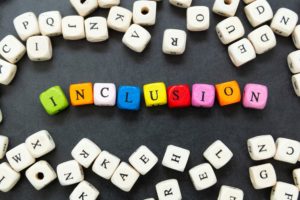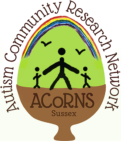This month we turned to the topic of autism and employment, after hearing a great podcast from Sophie Longley, who also came along to support our discussion. Our readings were:
This time we had some questions to ponder in advance. Here’s what we discussed on each one.
What changes do you want to see all employers make to support both diagnosed and undiagnosed employees?
People wanted to see greater awareness and understanding of autism and what this can mean in the workplace. There needs to be a clear understanding of the spectrum nature of autism e.g. how everyone is different with  unique needs. Most people have only met 1 or 2 autistic people and generalise from this. Understand that everyone is different, and that autism is a spectrum really helps: so, noise-cancelling headphones might be useful for one person but not another. Who should decide what’s needed? It can’t just be the employer: it has to be a two-way conversation with the autistic person. What adaptions are needed, what are their strengths and how would they like to be supported? It can be worth being ambitious: sometimes there is more support out there than you think. The DARE website is useful here. On person pointed out that for some autistic people, self-advocacy is a real strength, but others might need support to make a case.
unique needs. Most people have only met 1 or 2 autistic people and generalise from this. Understand that everyone is different, and that autism is a spectrum really helps: so, noise-cancelling headphones might be useful for one person but not another. Who should decide what’s needed? It can’t just be the employer: it has to be a two-way conversation with the autistic person. What adaptions are needed, what are their strengths and how would they like to be supported? It can be worth being ambitious: sometimes there is more support out there than you think. The DARE website is useful here. On person pointed out that for some autistic people, self-advocacy is a real strength, but others might need support to make a case.
We discussed how flexibility on the part of the employer is key. For example, a simple adaptation such as being told the topic of a meeting beforehand can make all the difference in removing anxiety. We agreed that many adaptations would help neurodiverse people more generally, diagnosed or not.
Disclosing your diagnosis
We discussed how deciding whether to disclose your autistic can be a tricky decision. Many people had experienced burnout since getting an autism diagnosis and not feeling able to disclose it. One person shared how, since being diagnosed, they have only worked in jobs where their diagnosis is relevant (e.g. working in inclusion roles) but felt unsure about disclosing this in some other professions. There are pluses and minuses of disclosing.
 One person raised the importance of educating not just the employer but also the workforce. One person cited some negative responses they’d had from co-workers. This speaks to the need for much wider education and awareness. One person said relying on a diagnostic criterion such as the DSM-5 might not fit the wider, changing perspectives of autism, such as the greater diagnosis of females. We looked forward to the day when disclosing autism is always met by acceptance of difference.
One person raised the importance of educating not just the employer but also the workforce. One person cited some negative responses they’d had from co-workers. This speaks to the need for much wider education and awareness. One person said relying on a diagnostic criterion such as the DSM-5 might not fit the wider, changing perspectives of autism, such as the greater diagnosis of females. We looked forward to the day when disclosing autism is always met by acceptance of difference.
Work experience
Someone raised the question: how can neurodiverse people get more opportunities to take part in more work experience? ACoRNs Southampton recently ran a research project where autistic students from a special school created video games with help from industry experts. Employers were surprised at the high quality of the games they created. Equally, some students went in keen to do programming, but enjoyed making the music or artwork more. Another good example is the partnership between Autech and ACoRNs Sussex on the Our Stories/Just Right project. This partnership has provided excellent potential career role models for all the students involved. This suggests we need to continue to raise expectations about the potential of autistic people, as sites like ‘A Potential Diamond’ do. Opportunities such as partnering schools with industry experts can help do this, but it’s important to remember, this great work has been produced in a supportive environment, with the adaptations needed to showcase autism strengths.
Being autistic in certain careers
 Members of the group found that being autistic can be an asset, for example when working with autistic children and families. One person said being autistic helped them as a teacher, being more mindful about the classroom environment and ensuring autistic children were not overlooked. However, there were some negative perceptions from some parents. A recent book looks at what autistic teachers can bring
Members of the group found that being autistic can be an asset, for example when working with autistic children and families. One person said being autistic helped them as a teacher, being more mindful about the classroom environment and ensuring autistic children were not overlooked. However, there were some negative perceptions from some parents. A recent book looks at what autistic teachers can bring
We discussed a recent Guardian article about being autistic in healthcare roles, such as nursing, clinical psychology and therapy. Any stigma attached to autistic people going into such roles shows some of the misconceptions about autistic people e.g., supposedly lacking empathy. Maybe we need another book on Learning from Autistic Careworkers?
Some tech companies have specific recruitment pathways for neurodiverse people in recognition of autistic strengths here in coding or paying attention to detail. But tech isn’t the only place for these strengths: one person quoted the phrase “You can’t be what you can’t see”. Highlighting successes of autistic people in hospitality, teaching or healthcare could really inspire employers and employees to see the potential. The low unemployment rate of autistic people is not simply due to low qualification or skill: employment rates are low even in autistic graduates.
strengths here in coding or paying attention to detail. But tech isn’t the only place for these strengths: one person quoted the phrase “You can’t be what you can’t see”. Highlighting successes of autistic people in hospitality, teaching or healthcare could really inspire employers and employees to see the potential. The low unemployment rate of autistic people is not simply due to low qualification or skill: employment rates are low even in autistic graduates.
Retention and career progression
Staying in a job is as important as getting the job in the first place. one person asked: How many of the 70% of unemployed autistic people have been employed but left following negative experiences? More research and strategies are needed here.
Employment post-COVID
What difference has Covid-19 made to employment in autism? Post-covid we are seeing the emergence of more remote positions. Although not for everyone, working from home can be great for some people and may help them adapt work conditions better and avoid potential stressors such as the travel to work and socializing with people all day. A mix of working from home and office might really work for some.
remote positions. Although not for everyone, working from home can be great for some people and may help them adapt work conditions better and avoid potential stressors such as the travel to work and socializing with people all day. A mix of working from home and office might really work for some.
Found this interesting? Want to join our next meeting? Email: acorns@sussex.ac.uk to join the mailing list.
